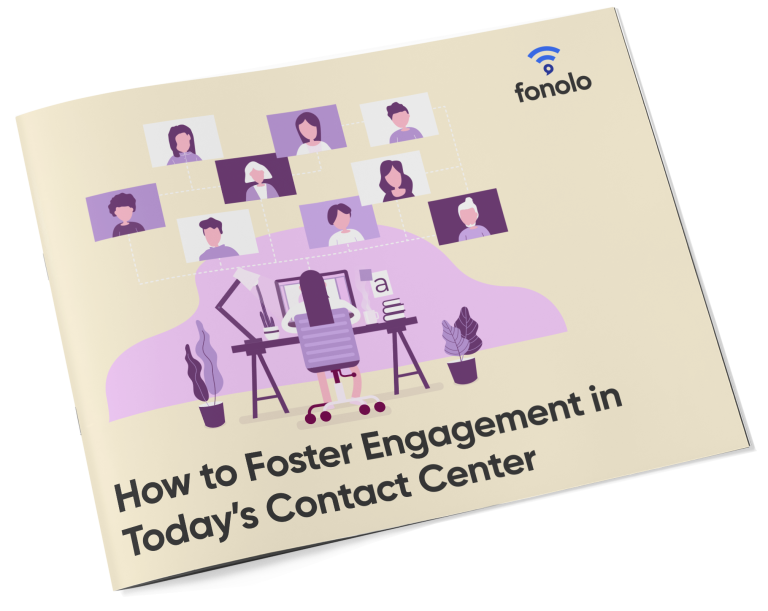The numbers are in, and the truth is out: the American workforce is pretty underwhelmed these days.
Only 30% of American workforce says they’re engaged and inspired at work, with the other 70% identifying as ‘disengaged’ employees who do the bare minimum. For call center managers, this disparity is a big cause for concern.
Call center managers who can’t discern an engaged call center employee from one who has their foot firmly out the door are at a big disadvantage. Those leaders focusing only on the task-based output of workers while ignoring agent engagement and general well-being will likely lose top employees to competitors, and have to foot big bills related to recruitment, training, and turnover. Plus, every time an employee leaves, they risk lowering their call center’s morale, threatening the engagement of the staff who are left behind.
If you want high productivity and a positive culture for your contact center, but don’t value or monitor call center agent engagement, your growth will be forever stunted. Luckily, taking steps to monitor and improve call center agent engagement is fairly easy. Read on to learn what engagement actually looks like, and why you should care.
What does an engaged call center agent look like?
Like any top-notch, dedicated employee, the engaged call center agent is diligent, finds joy in their day-to-day tasks, always seeks to improve their skills, and understands your mission and your business’s bottom line. Need help identifying the cream of the crop? Keep an eye out for agents who exhibit at least one of the following behaviors.
1. They’re motivated to excel in their work.
Engaged contact center staff are “present,” active participants in their daily work. While their motivations may vary (career growth, rewards or benefits you offer them, furthering the company’s profile, or simple happiness in their job), they show up to the office every day with great enthusiasm and give the sense that they really want to be there and help your department and the overall company succeed.
2. They understand the big picture of the business (and their role).
Agents who are focused and enthusiastic on the job are more likely to be those who understand the overall mission of the business, where it is headed, and how their specific role contributes to this overall big picture. They are able to visualize the overarching goals of the company, as well as their own personal goals. Their approach to day-to-day work is inextricably linked to contributing to both sets of goals. This is why engaged employees tend to respond positively and proactively to any goal-setting steps you may take as a manager.
3. They always take ownership.
Dedicated, satisfied employees tend to take ownership rather than pass the buck, remaining committed to improving themselves and growing their set of responsibilities. They ultimately take ownership of and pride in their own role and daily tasks, knowing how every action they take relates to the overall machinery of the business. Additionally, they are likely to find workplace challenges a fun exercise, proactively seeking solutions in order to learn, grow, and support their fellow staff.
Why does call center agent engagement matter?
There is overwhelming evidence to suggest that call center agent engagement impacts your workplace culture as well as your call center budget. Once you invest in your agents and their overall engagement, you will see a significant correlation between agent engagement and higher performance, better customer satisfaction (CSat) scores, and overall call center culture.
There are several reasons why call center managers should focus on engaging their agents in a way that makes them feel valued by the overall business.
1. Recruiting new call center agents is expensive.
When a call center agent is disengaged, not only do they leave the premises, they leave their call center with the cost of recruiting, re-hiring, and retraining in their dust. Replacing a single call center agent can run a company as high as $20,000 USD in costs. This doesn’t even include the deficit in knowledge that occurs when a senior agent bids your call center farewell.
So, how does a customer service department save themselves some serious funds? They should focus on engagement, which ultimately drives agent retention as well as a boost in consumer-focused metrics. According to Gallup, “highly engaged business units achieve 59% lower turnover,” which helps them achieve a 10% increase in customer metrics and a 20% increase in sales.
Taking steps to improve engagement and avoid big costs doesn’t have to be complicated. Working on team communication, rewarding your agents when they really excel, and giving solid feedback on a consistent basis are all low-cost steps to improving engagement, and retention, in the long run.
2. Happier employees mean higher profits.
On a related note, engaged employees can impact your business’s bottom line by nurturing higher profit margins. In fact, companies with higher employee engagement are reported to be 21% more profitable.
It is likely, then, that you’ll see some impressive ROI if you begin investing in call center agent engagement and well-being. Even small steps like offering virtual lunchrooms or meet-ups, or instituting consistent meetings or huddles can have a huge impact on revenue. In fact, McKinsey reported that one company was able to produce a sustainable 50% boost in revenue as a result of frequent and focused huddles.
Ultimately, investing in agent engagement is an investment in the overall business, which has a long-term positive impact on sales growth and customer retention.
3. Agent attrition is a growing problem.
Fonolo’s State of the Contact Center Report found that agent attrition is actually getting worse. This is in part related to COVID-19’s impact on agents’ physical and emotional states, as it has increased demands on their listening skills, their ability to emphasize, and their stress levels. How does this affect the bottom line for businesses? Contact center leadership is now reporting that recruitment and turnover are serious and extremely costly challenges they face.
Finding ways to engage your agents can increase their happiness and, in doing so, make them less likely to leave you behind. Saving them from saying ‘bye’ can also save you on turnover recruitment, and training costs.
4. Happier agents could mean happier customers.
The math makes sense: if your call center agents are happy, they’re more likely to nurture a happier customer experience, which in turn could boost return customers and reliable sales. (And, if you’re concerned with metrics, positive engagement has been proven to increase CSat scores.)
One of the pathways into your call center agents’ hearts is to give them the tools they need to tackle the most stressful parts of their jobs, such as spikes in call volume during peak periods. Boost engagement by showing your agents you support them by offering them tools that take the edge off these high-anxiety moments, like overflow handling services or call-backs. These ensure your agents don’t get overloaded during peak periods and can reduce stress and boost positive attitudes in the workplace.
The time is now to double down on improving engagement in your call center. When you do, you will see a significant pick-up in sales, call center metrics like CSat scores, and in general, the health of your call or contact center.



